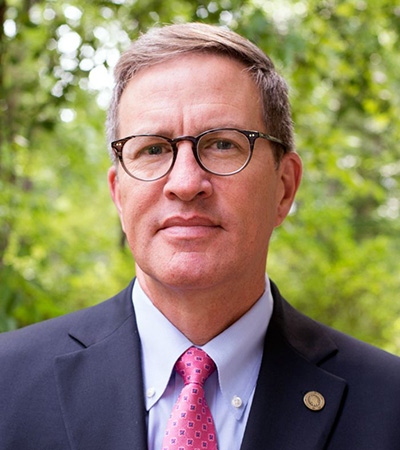 Christopher S. Brown, Ph.D., former vice president of Research for the University of North Carolina System, has been named vice president of Research at the University of Alabama at Birmingham.
Christopher S. Brown, Ph.D., former vice president of Research for the University of North Carolina System, has been named vice president of Research at the University of Alabama at Birmingham.
Brown comes to UAB from North Carolina State University, where he is a professor of plant and microbial biology and works across disciplines to develop large-scale research teams. He is the director and principal investigator of the NASA/North Carolina Space Grant, as well as chair of the 50-state National Space Grant Alliance.
Brown has more than 26 years of experience in research, teaching, research program leadership/management/development, strategic planning, and university/government/industry collaboration.
“UAB recently vaulted 36 spots in U.S. News & World Report’s Best Global Universities, due in large part to our growing world impact in research,” said UAB President Ray L. Watts. “I am confident that Dr. Brown is the right leader to capitalize on that momentum and continue to identify new opportunities that will ensure further growth and transformative results.”
From 2012-2016, Brown served as the vice president of Research at the University of North Carolina System, with its 16 public universities, $1.35 billion in research awards in 2015 and 225,000 students. New awards for UNC System research grew by $125 million during his time as vice president.
In his new role at UAB, Brown is charged with broadening UAB’s research portfolio across campus and driving strategic planning and research operations. He will leverage fresh approaches to help faculty and students successfully compete for large federal, corporate and foundation grants.
“I am honored President Watts selected me to lead research at this institution of talented and hardworking students, faculty and staff intent on changing our world for the better,” Brown said. “What stood out to me as I pursued this position with great enthusiasm is the opportunity to aggressively expand UAB’s already impressive and impactful research portfolio to drive discovery and economic development.”
A 17-member search committee co-chaired by Vice President for Information Technology Curt Carver and School of Medicine Executive Vice Dean Anupam Agarwal, with student, faculty and staff representation, reviewed applicants, identified finalists, facilitated public presentations and solicited feedback from the campus community.
“The search committee deserves special recognition for the time and effort given to this process,” Watts said. “They were very thorough in vetting a deep pool of impressive candidates who wanted to be part of our great organization, and UAB thanks them.”
Brown’s Oct. 21 public presentation is available to UAB students, faculty and staff online.
Since 1996 as a faculty member and research scientist, Brown has received more than $22 million in grants and contracts for research, education and commercial development projects from federal and state sources. This sustained effort has resulted in more than 70 refereed publications on topics in gravitational and space biology, development of technology for spaceflight, and plant physiology, as well as numerous reports and interactions with local, national and international media. While his formal training is in plant physiology and biochemistry, he has worked across disciplinary boundaries including engineering, education, design and others.
Throughout his career, Brown has worked to promote scientific research and the translation of its value to federal and state lawmakers, his peers, and the public. His skill in articulating the value of science, technology and education to policymakers and funders has been recognized and honed through many roles, including president of the American Society for Gravitational and Space Biology, chair of the National Space Grant Alliance, and strategic plan development chair for the North Carolina Biotechnology Center.
Brown was the founding manager and lead scientist for the Plant Space Biology Laboratory at the Kennedy Space Center. This Dynamac/Bionetics-run laboratory worked with NASA leaders and scientists from around the nation and world to consult and collaborate on Space Shuttle and ISS experiments. From 1989-1996, Brown and members of his team performed their own research on the effects of gravity and spaceflight conditions on plant metabolism and physiology. His experiment, BRIC-03, was the first STS/space biology project to be developed and carried out entirely by Kennedy Space Center personnel.
Brown’s first day at UAB will be Jan. 23, 2017.